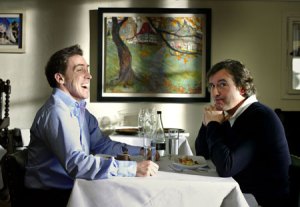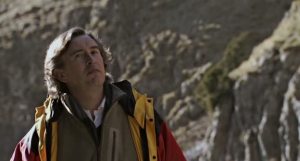In 2002, English filmmaker Michael Winterbottom directed the little seen but aggressively unique pseudo-biopic/documentary 24 Hour Party People, a fictionalized retelling of the “Madchester” music scene of the 80’s brought about by famed news personality and music enthusiast Tony Wilson. The use of handheld cameras gave the film a documentary feel but Wilson (played by TV character actor Steve Coogan) is both omnipresent and omniscient in the film, calling out events before they happen, often while directly talking to the audience. It’s an energetic use of self-reflexivity that ties into the film’s punk aesthetic by recognizing the artifice of trying to mimic the slippery status of what “cool” was at the time, while also chasing after that same status in a modern context, where cultural currency demands self-awareness and reference, or as Wilson puts it, “being postmodern, before it’s fashionable.”
Winterbottom and Coogan reteamed in 2006 for the comedy Tristram Shandy: A Cock and Bull Story, which begins as an adaptation of Laurence Sterne’s hyper-self-aware novel before pulling back another layer and documenting the often professional and always petty struggles of star Steve Coogan, playing “Steve Coogan”, as a kind of prankish meta-humour that’s largely based on the viewers familiarity with him. As if intent on bucking the trend, Winterbottom’s latest film, The Trip, is a largely improvised quasi-documentary following Coogan and comedian Rob Brydon as they tour Northern England reviewing restaurants, a plot summary that would suggest a maturing of the director out of his “punk” decade. Whereas their previous collaborations were boastfully subversive, The Trip is played entirely straight and dialled so far back that even the title barely registers in the shadow of Winterbottom and Coogan’s last two films.
Pared down from a 6-hour BBC series, the film holds no real plot behind the basic premise and is more interested in the interplay between its two travelling companions than the restaurants being toured. Originally planned as means to impress the girlfriend who recently dumped him, Coogan asks his occasional co-star and sometimes friend Rob Brydon to come along instead and their relationship is the meat of the film. Thankfully, it’s a very funny one as Coogan’s mock disdain for Brydon, particularly his reliance on eerily accurate celebrity impressions, is borne by Brydon with a light-hearted enthusiasm. Even when Coogan calls out his career as mediocre, Brydon takes solace in the words of Bob Balaban of all people, knowing that it’s better to have a career that’s consistent, instead of one that supernovas, an act that Coogan (so he thinks) is trying to repeat.

Despite Coogan’s efforts to establish himself as not just different but superior to Brydon as a comic, the film is often at its funniest when the pair come together, often in the form of tandem riffing to an offhand comment. Two-minutes of car travel produces serious laughs when one realizes that commander’s in costume dramas always demand their troops to be up at daybreak, “they never leave at, you know, 9:30”. Each employs a mix of character comedy and intellectual allusions, with Brydon favouring the former and Coogan the latter, producing on-screen chemistry that’s equal parts chummy and combative. Even when performing duelling impersonations, the two click together perfectly, with Brydon nailing the voices and Coogan adopting the mannerisms, between the two making a strong case for the existence of a kitschy form of comedy.
It’s when they’re apart that the dramatic elements of the TV series interject and it’s likely in these moments that the audience will decide just how much they enjoy the film. The constant barbing back and forth inevitably ends with Brydon coming out on top; despite winning only mock interest and half-hearted scorn from his long time friend, Rob has not only come to terms with but come to love where he is in life. He’s married, happily, a father and relishes his moments in the spotlight regardless of how small, even the ones that don’t even make it into the final cut. Rob has carved out his place in the world and seems damned proud of it, which is the unspoken source of Steve’s disdain, envious of the satisfaction Rob has attained but to proud and self-serious to stoop to what he would consider settling.

Coogan has spent so long on the brink of stardom that the chase has left him worn-out professionally and personally; he’s divorced, in a failing relationship and is a father only when his ex needs him to play the bad-cop to his teenage son. Whether Coogan’s mid-life crisis holds any water for the audience is almost entirely determined by the viewer’s context of him. On its own, the conflict of a B-list actor trying to claw up to a higher strata falls short due to the lack of proper on screen development, with Brydon’s married bliss laid on a little too thick and Coogan’s moping veering dangerously close to maudlin thanks to an intrusive piano score. It’s still often very funny, but the dramatic beats come off as unnecessary, often seeming the chaff that should have been cut from a comedy that’s overlong at 105 minutes.
But when looking at the film as the third entry in what I’ve dubbed the Steve Coogan trilogy (which seems appropriately self-aggrandizing), The Trip transcends its comic trappings and develops a kind of quiet melancholy. Whether it’s seeing Coogan’s sterile stainless steel loft or watching him try to connect with his girlfriend from atop a deserted and snowy mountain, it’s apparent that his ambition has driven him into solitude and it hits hardest of all when you’ve been watching him for nearly a decade. Winterbottom’s meta-narrative gave 24 Hour Party People an edge, while Tristram and Shandy mined the technique for knowing winks and feigned self-deprecation but now it’s 2011 and Winterbottom doesn’t haven’t pull back anymore; “Steve Coogan” the character is so interwoven with Steve Coogan the actor that you don’t know who you’re watching and it’s then that The Trip’s emotional centre finds real resonance. If 24 Hour Party People was his taste of glory and Tristram Shandy his struggle to hold onto it, The Trip may be the juncture that determines the rest of Coogan’s life. To hell with Alan Partridge, the best character Steve Coogan has ever played is himself.


